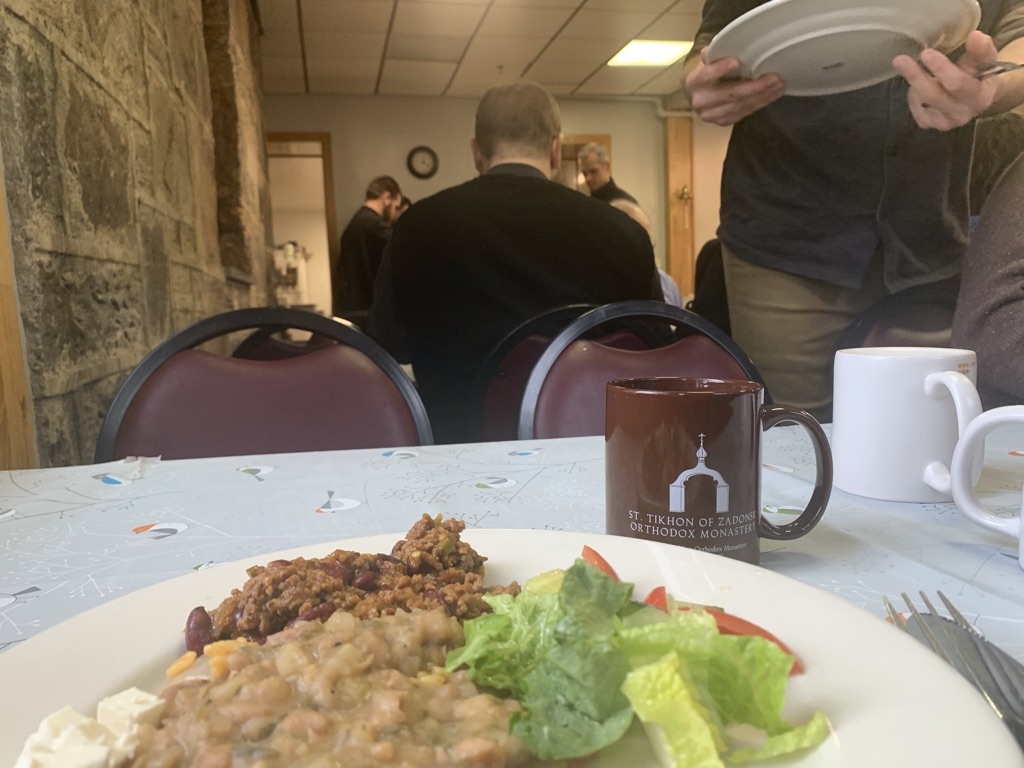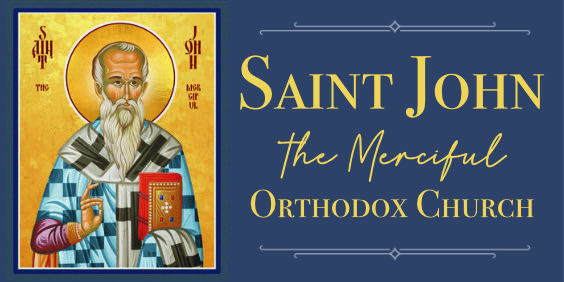Services in this Orthodox Church may be very different than you have experienced in the past. We want you to feel comfortable and very welcome, joining with us in joyful worship. We will not single you out or do anything to embarrass you. Here are a few things that may help orient you a bit to our services:

God is in this place!
We believe that in this church, we stand in the very presence of God, and that we join the saints and heavenly hosts in joy and prayer and worship. For that reason, we try to avoid “chit-chat” in church, but to stand with reverent awe and attention to God.
We don’t at all want to be unfriendly! We want to say “Hello!” and to welcome you, and get to know you, and help you get to know us and about our Church! But during the actual services in church, and also before the services, as people are silently preparing to worship, we try to avoid conversation.
So, during the services, please join with us in joyful and reverent prayer and worship. And after the services, please join us for conversation and have some coffee or tea and a bite to eat, where we can welcome you and try to get to know each other, and answer any questions you may have.
We are grateful to God for bringing you to visit us here online today — we look forward to meeting you in person!
The Service Before the Service
The Divine Liturgy, our main Sunday Worship service, begins at 9:30am but it is preceded by two shorter prayer services, the 3rd Hour and 6th Hour (beginning at 9:10am), which may seem like you are late if you walk in at 9:30am and observe prayers already in progress, but we are used to people coming in and out so your entrance will not cause a disturbance—come in and find an area to stand or sit and someone will welcome you and answer any immediate questions.
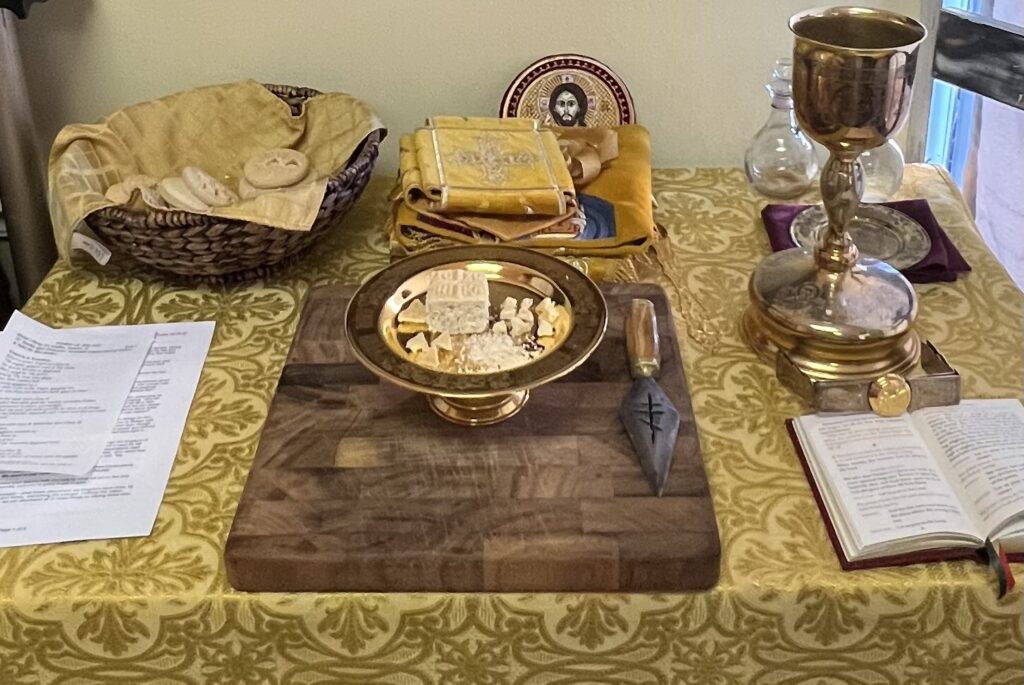
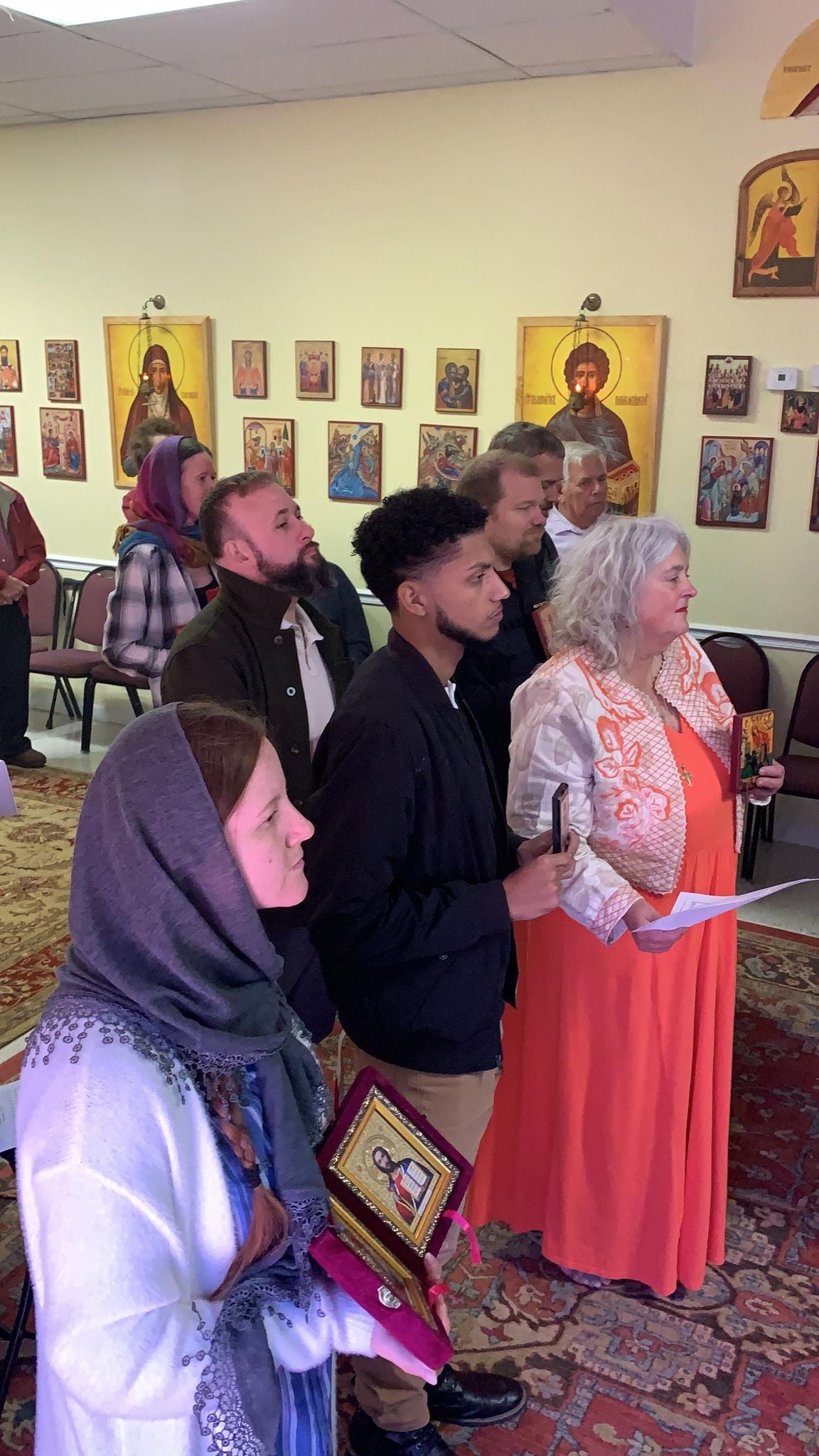
We Stand to Pray
In the Holy Scriptures, the typical posture of prayer was standing. Jesus said, “And whenever you stand praying…” (Mark 11:25). The ancient Christian practice has always been standing to pray. Orthodox Christians traditionally hold fast to the ancient ways. By all means, those who are unable to stand may sit in the chairs along the walls.
The Sign of the Cross
Orthodox worship involves the whole person: the mind, the heart, the senses—the entire body. We engage our bodies in prayer as we make the Sign of the Cross as an expression of our faith in the Father, the Son, and the Holy Spirit, and when at times we bow or make a prostration before God in repentance, humility, and worship, but there is no expectation that our visitors who are unfamiliar with these bodily forms of worship will participate.
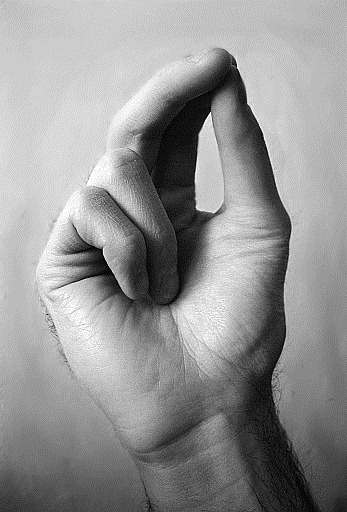
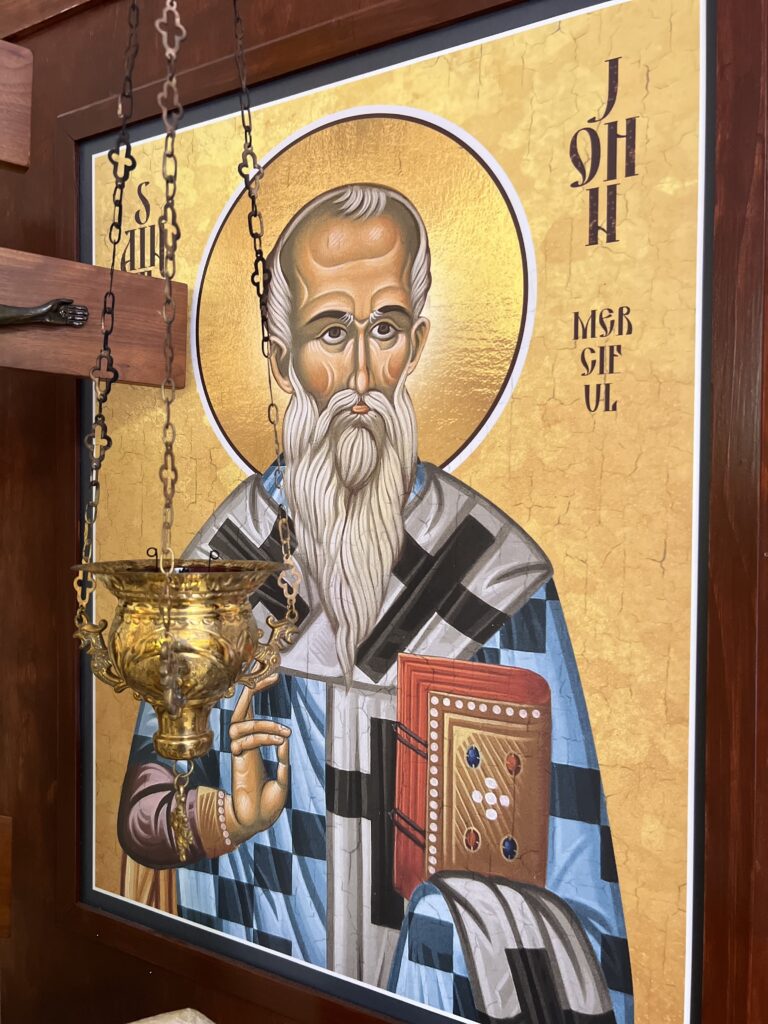
Icons
Orthodox Christians do not worship icons! We worship God, and God alone. Many people will treat photographs of loved ones with special care, putting them in lovely frames, in a special place, etc.. It is not the paper photograph they honor, but the person in the photograph. “Icon” means “image,” and Orthodox Christians “venerate” (honor) the person represented in that image by bowing and even kissing the icon much like someone may kiss a photograph of their grandmother.
The Divine Liturgy
The word, “liturgy” comes from a Greek word meaning “the work of the people,” and it refers to people gathered together, praying with one mind and one heart. Many people do not realize that the first Christians regularly prayed together in liturgical prayer. The Apostles and many of the first Christians were Jews, and were accustomed to praying in liturgical services in the Jewish Temple. St. James, for example, continued to pray in the Temple until he was martyred for Christ.
The Divine Liturgy of the Orthodox Church developed over centuries as people of prayer, filled with the Holy Spirit, prayed and sang to God. The services in our church are entirely in English, so even if you are not familiar with this type of prayer and worship, you can hear and understand, and pray together with us and with the saints and angels:
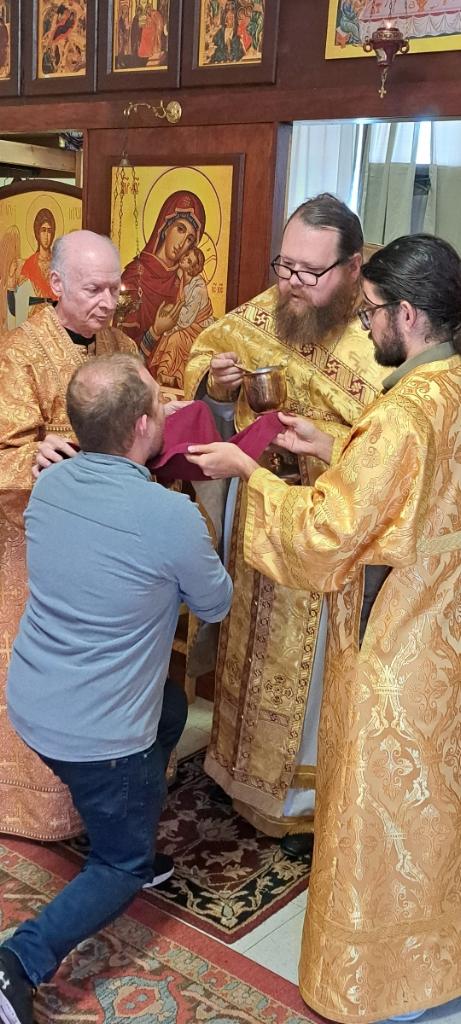
The Eucharist (Holy Communion)
Orthodox Christians view the Eucharist as deeply, awesomely holy, and are mindful of St. Paul’s words, “Whoever, therefore, eats the bread or drinks the cup of the Lord in an unworthy manner will be guilty of profaning the body and blood of the Lord. Let a man examine himself, and so eat of the bread and drink of the cup. ” (1 Corinthians 11:27-28)
We know that it is not our own efforts but only God’s grace that can make us worthy of Communion with Him. But to prepare and “examine ourselves” before coming for Communion we fast, pray, examine our hearts and our actions and repent and confess our sins, seeking absolution from God. All are called to God’s table, but please respect this ancient and venerable Christian practice, and do not come up for Communion without speaking to our priest before the services begin about appropriate preparation.
“Instead of the Gifts”
After one of the faithful receives communion, they will normally partake of a piece of blessed bread and will also bring pieces of this bread for those they know who are not prepared for the Eucharist.
If someone hands you a piece of bread after they have gone to Communion, this is not the Eucharist itself but is blessed bread that is given as a sign of our wish that we can one day share communion with you. The greek name for this blessed bread—”antidoron”—means “instead of the gifts” .
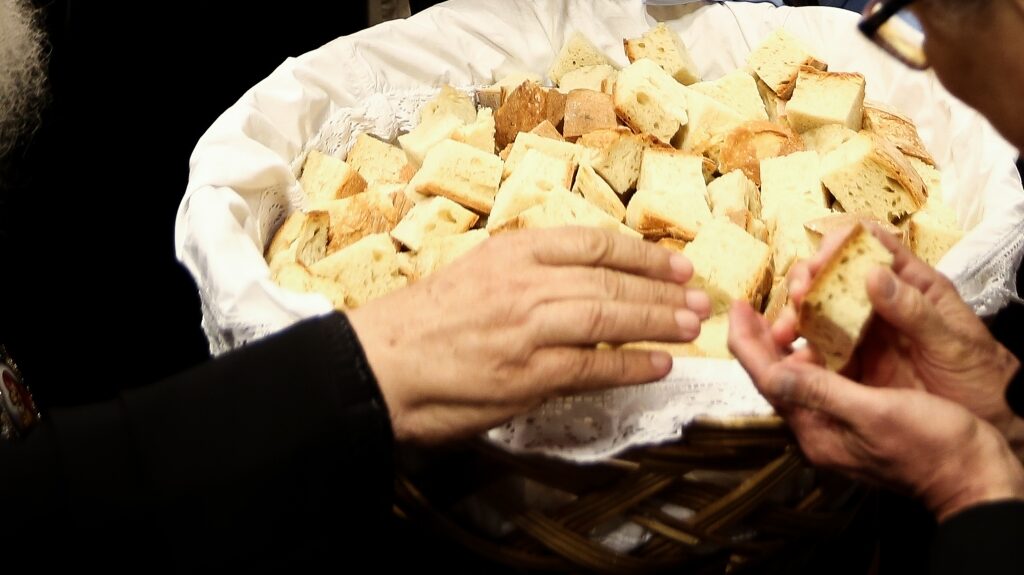
Why Do We Keep Asking for Mercy?
You will hear, “Lord, have mercy” frequently in our services. To many people, “mercy” is what one asks for when one is about to be judged or killed, so some visitors might suppose we are cowering in fear before a vindictive or hateful God. Nothing could be farther from the truth! We know God as the Lover of Mankind, infinitely compassionate, and infinitely loving!
The original ancient Greek words translated into English as “Lord, have mercy,” have a very different meaning than what many of us today tend to think of in their English translation:
The word mercy in English is the translation of the Greek word eleos. This word has the same ultimate root as the old Greek word for oil, or more precisely, olive oil; a substance which was used extensively as a soothing agent for bruises and minor wounds. The oil was poured onto the wound and gently massaged in, thus soothing, comforting and making whole the injured part. The Hebrew word which is also translated as eleos and mercy is hesed, and means steadfast love. The Greek words for “Lord, have mercy,” are “Kyrie, eleison” that is to say, “Lord, soothe me, comfort me, take away my pain, show me your steadfast love.” Thus mercy does not refer so much to justice or acquittal, a very Western interpretation, but to the infinite loving-kindness of God, and his compassion for his suffering children! It is in this sense that we pray “Lord, have mercy,” with great frequency throughout the Divine Liturgy.
Adapted from the book, Orthodox Worship, quoted here: Kyrie Eleison, Lord Have Mercy.
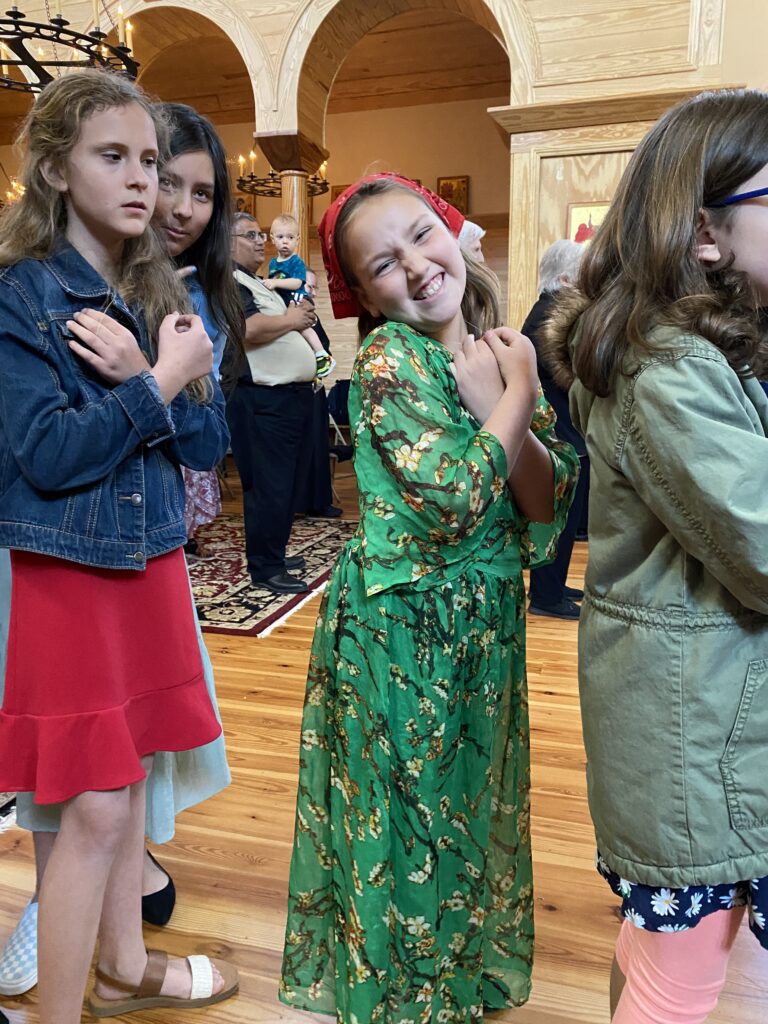
Children
Children are very welcome in God’s house! “Let the children come to me; do not hinder them, for to such belongs the kingdom of God.” (Mk 10:14)
If children become so restless or loud that they are disturbing others’ prayer and worship, their parents may briefly escort them outside. In general, we try to avoid disrupting Divine Worship by coming and going, but this must be tempered with love, and small children may need for loving parents to take them out, briefly, and to return when they are able to do so.
Read more at Families at SJTM
Dress
Some people like to wear their very best. Others choose less formal clothing. In general, clothing in church should be modest, clean and unobtrusive. There is a wide variety of clothing styles in our church, and we want you to feel welcome and comfortable.
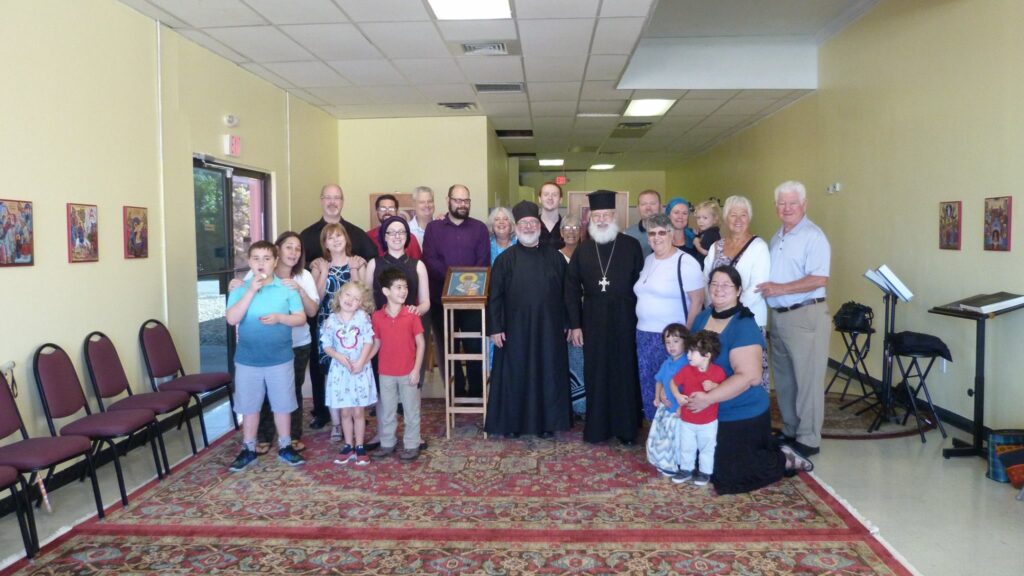
12 Things I Wish I’d Known (Before my First Visit to an Orthodox Church)
12 Things I wish I’d known. . ., written by Frederica Mathewes-Green, a beloved Orthodox author, is also a very helpful resource for a first visit to an Orthodox church.
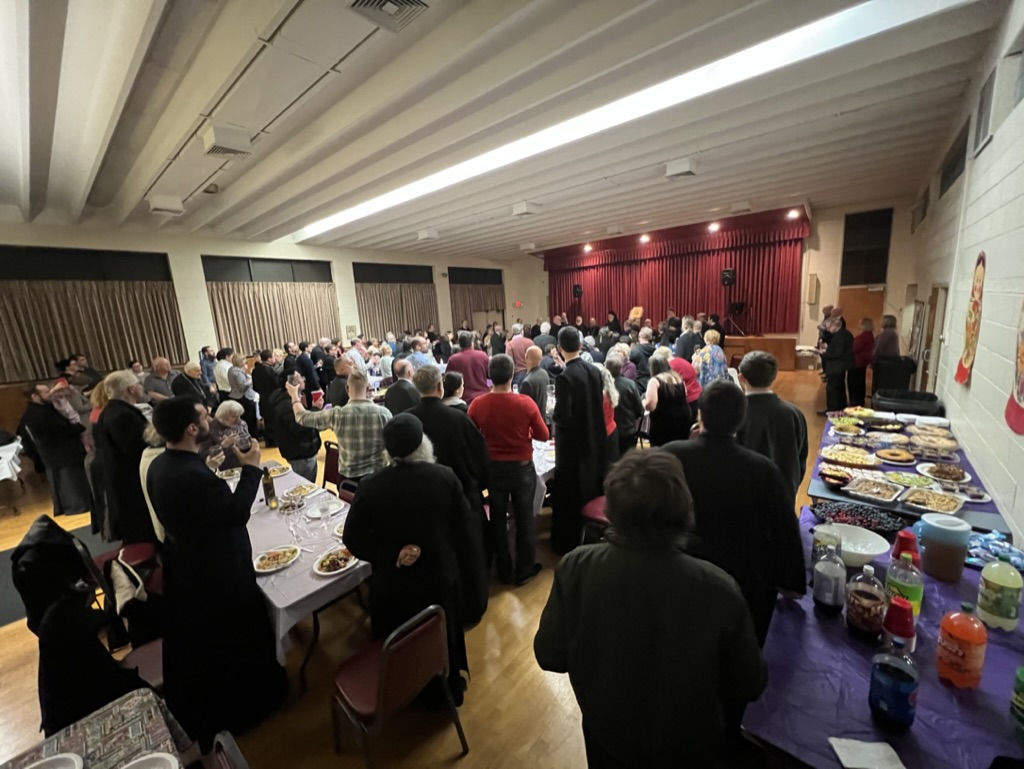
Coffee Hour: The Liturgy after the Liturgy
At the end of the Divine Liturgy, there are a few announcements and brief post-communion prayers, then we host a shared meal we refer to as “coffee hour” but it’s always more than coffee and always more than an hour! If you’re visiting, please stay and share our hospitality. We would love to welcome you and get to know you. Many friendships are formed during coffee hour conversations, and kids have a chance to run out some of the pent-up energy from the service. Even if you can only stay for a few minutes, Fr. David would love to greet you personally before you leave.
